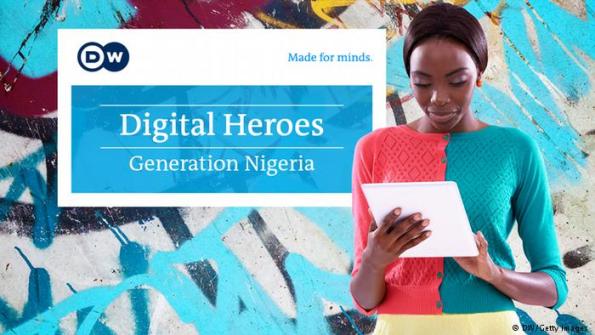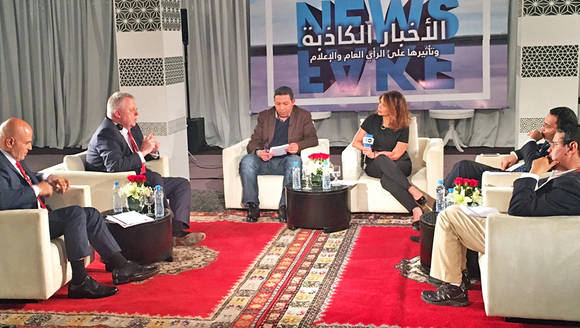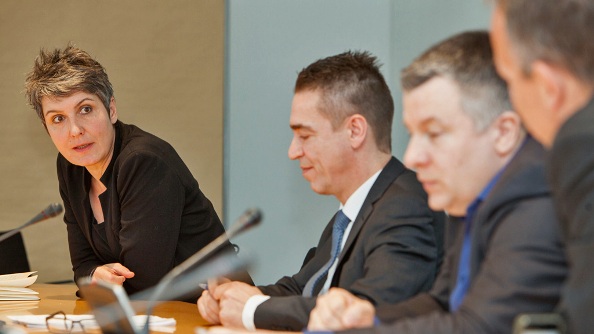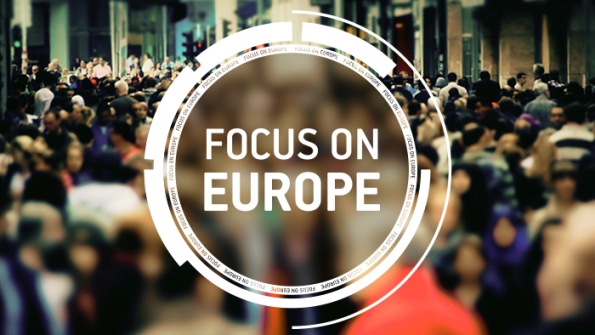DW is advancing digital activism in Nigeria
 Social media and digital activism play a pivotal role in the media landscape of developing countries. DW’s blogging contest, Digital Heroes – Generation Nigeria, put a spotlight on Nigeria’s brightest young bloggers who care about the future of their country.
Social media and digital activism play a pivotal role in the media landscape of developing countries. DW’s blogging contest, Digital Heroes – Generation Nigeria, put a spotlight on Nigeria’s brightest young bloggers who care about the future of their country.
They contestants were asked to create a written, photographic or video project that addressed environmental issues in Nigeria. Over 400 entries were received. At an event in Lagos last week, the winners were honored and the grand prize was awarded to a photo project that profiled widespread oil pollution in Nigeria’s Niger River Delta.
Social media has become indispensible for Nigerian youth and beyond being used a social tool, it is now growing into a social force. The winner of the contest, Solomon Sodeinde, said that social media is the most effective way to raise awareness amongst youth. His project on the Niger River Delta serves as an example of the power that can be placed in the hands of active young people who see problems in their societies.
At the discussion, Nigerian social media experts and bloggers discussed the growing importance of social media in Nigeria and the risks and opportunities that it presents. With the widespread availability of information on so many networks, it is the bloggers’ responsibility to make sure that there work is based on facts and research.
The contest is part of DW’s digital strategy, which isn’t only about producing the best content for users, but also about helping create a culture of digital activism in our broadcasting regions around the world.
How traditional media is battling fake news
 Mobile news content is where most readers turn to for their daily intake of information and entertainment. And the rapid-fire mobile news environment has created fertile ground for for fake news and poor-quality content. This is a hugely important topic for producers of digital news.
Mobile news content is where most readers turn to for their daily intake of information and entertainment. And the rapid-fire mobile news environment has created fertile ground for for fake news and poor-quality content. This is a hugely important topic for producers of digital news.
During a recent conference with media partners in the Moroccan capital Rabat, Peter Limbourg, DW’s director general, joined representatives from Moroccan media and politics and underlined the importance of ensuring quality in digital media. Limbourg showed how the standards of accuracy, verification and thorough reporting by “traditional” media can set an important example as traditional shifts to mobile. The talk also focused on how to distinguish fake news from bad journalism and how DW ensures a high standard of quality across all outlets.
DW’s international focus means that working with partners around the world is essential to building a foundation for new ideas and cooperation.
Hespress is a Moroccan example of successful digital media that is produced independently with a high standard. Founded ten years ago, today it is the country’s top news website and is one of the most-popular sites in the Maghreb. The success of the website is centered around its digital first strategy and understanding how digital media is becoming the primary source of news and information for audiences everywhere.
DW Akademie is also very active in the region in promoting quality digital media. DW’s center for international media training is currently working with the ISIC, Morocco’s renowned journalism training institute, on creating educational strategies for developing and organizing digital media.
Support from broadcasters like DW sets an international standard for media, which most importantly, is built on a tradition of credibility and professionalism that is true no matter what medium the audience uses.
‘Be brave and ask questions that agitate’

When terrorists attacked Charlie Hebdo, Ines Pohl was the editor in chief of alternative Berlin daily Die Tageszeitung (taz), known for going against the mainstream and breaking taboos. As she and her colleagues absorbed the news of the massacre, Pohl said she wondered if taz would be next. But instead of giving in to fear, she decided that taz would publish the first Charlie Hebdo cover after the attack, which controversially portrayed the Muslim prophet Mohammed. Pohl said that it was the duty of journalists to “hold back this fear and stand up for our free democracies.”
Now as editor in chief at DW, Pohl will bring this courageous spirit and an innovative attitude to DW’s journalism.
Before becoming editor in chief, Pohl was DW’s Washington correspondent. During the 2016 US presidential campaign, she helped lead the social media project #Whatamerica. Using short video interviews and vox pops, the project shared a unique perspective on how American’s envision the political future of the US. It was also something new for DW and it demonstrated the success of engaging with the audience to tell better stories.
“The current election in the USA is an example of an increasingly polarized and short-winded media landscape,” said Pohl. “Without Twitter and Facebook there would be no Donald Trump. He lives off of scandalizing, and a hunger for quotas. Nuanced and bold reporting is poison for politicians like him.”
Pohl has a built a long career in journalism and while she emphasizes the importance of digital media, she also understands that interacting with people face-to-face is an essential aspect of being a journalist. “This is where I am more traditional,” she said. “Whenever possible, I think a conversation should begin with a handshake. This can say so much more than a thousand words in e-mails.”
Under Pohl’s the direction the future for DW’s journalism is in the hands of a forward thinking journalist who is not afraid to take chances. Pohl says DW gives her “the privilege to be able to work for quality and not for quotas.” She especially values the international perspective at DW and will seek to promote a multimedia atmosphere and experimentation more with of social media.
Market roundup: August 2016
Europe
DW’s Focus on Europe is now being broadcast in Georgia in cooperation with local broadcasting partner Starvision. The European culture and political program will be broadcast weekly with a Georgian-language voiceover and the program design will be adapted for the Georgian market. Starvision reaches 700,000 viewers and is also available on a free app for iOS and Android. This partnership expands DW’s presence in Georgia, where DW’s Russian-language news program DW Nowosti is currently being broadcast by Georgia’s national public broadcaster.
Latin America
WIPR, Puerto Rico’s largest public broadcaster, has expanded cooperation with DW and will soon be broadcasting more DW programming. WIPR currently broadcasts Euromaxx and DW Noticias during prime time. The channel, which focuses on educational and cultural content, can be received by more than 1,6 million households in Puerto Rico and will significantly increase the reach of DW’s Spanish-language programming.
Brazilian partner Claro will be providing DW’s German-English language channel DW (Amerika) to all of the Olympic villages in Brazil during the 2016 summer games.
The Museum of Tomorrow in Rio de Janeiro will also be including reports from DW’s Futurando! and Camarote.21 in its “Anthropozän” exhibit, which is visited over 100,000 times each month.
Guatemalan news website Siglo 21 has embedded DW content boxes in Spanish with articles and videos from Enlaces, Cultura 21, Global 3000 and En forma.
North America
Three Spanish-language programs from DW are being carried on Telecentro, a Hispanic-American broadcaster in Lancaster, Pennsylvania. Telecentro reaches 30,000 households.
Africa
DW (Deutsch) will now be available in 10 countries in southern Africa via pay-TV partner Multichoice. Countries included are South Africa, Namibia, Angola, Botswana, Lesotho, Malawi, Mozambique, Zambia, Swaziland und Zimbabwe. The channel will also be available to Multichoice hotel subscribers.
Angola’s first private television broadcaster, TV Zimbo, is broadcasting Futurando!, Camarote.21 and Africa on the Move in Portuguese. TV Zimbo will also become a coproduction partner for Euromaxx. The partnership is a positive step into a broadcasting market that had previously been inaccessible due to political conditions.
DW brings fresh perspective to Washington DC
People around the world are closely observing Washington DC this election season and DW is now giving audiences there a new source of international news they can use to understand the world better.
After a successful broadcasting agreement with longtime partner Megaherz, DW’s English-language channel is now being carried around the clock in its entirety to over 400,000 households in the Washington metro area. The agreement was announced at an ceremony in Washington attended by the directors of both DW and Megaherz along with guests from politics, business and media at the Newseum, a museum dedicated to news and free expression.
DW is also closely covering the US election with a special segment on social media, #whatamerica. DW correspondents in Washington and elsewhere are following campaigns and travelling the country asking the audience what they want for the future of America. The project reveals a personal side to the issues and introduces ordinary American voters to an international audience.
Select DW programming in English has been available since 2015 on Megaherz’s international channel, MhZ Worldview, alongside other broadcasters like France 24, NHK World TV and euronews. DW (Amerika) broadcasts the full range of DW’s German-language programming across the Untied States, Canada and Latin America.











Feedback